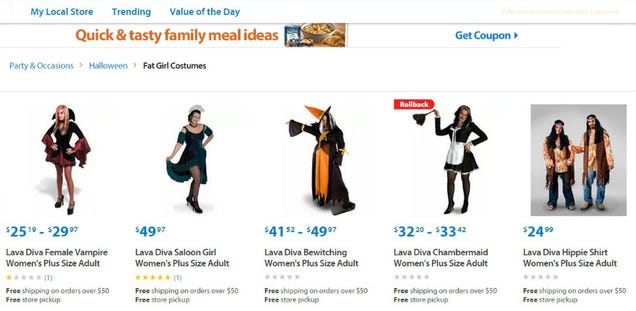
(photo via Jezebel)
As a joke, this heading is offensive. But, let's look at the larger picture. To start, I commend Walmart for featuring plus-size costumes. Not every retailer offers size-inclusive styles. And the offensive nature of the language itself is only a product of the relative value of fat versus thin in our current cultural climate. The fat acceptance movement, as evidenced by its name, has worked long and hard to reclaim the word "fat," from something offensive to a simple description of body size. If fat weren't such a bad thing, this section of Halloween costumes wouldn't have created such a stir - like clothing for tall women or petite women, we'd just file it away under offerings that cater to the natural diversity of body sizes. But because fat is such a dagger, this title becomes offensive.
So, rather than focusing on some retailer's joke or error, let's celebrate companies that offer plus-size fashions and let's continue to evolve our dialogue so that the use of the word "fat" doesn't fall prey to jokes or mistakes and, when used in earnest, is just a descriptor, not a headline.
You can find Does Every Woman Have an Eating Disorder? Challenging Our Nation's Fixation with Food and Weight on Amazon (as a paperback and Kindle) and at BarnesandNoble.com.
You can find Does Every Woman Have an Eating Disorder? Challenging Our Nation's Fixation with Food and Weight on Amazon (as a paperback and Kindle) and at BarnesandNoble.com.
 |

1 comment:
i'm with you, yet it seems like a "fat girl" can call herself that, but it's offensive coming from someone else. i enjoy "fat girl" literature, but i wouldn't write that without the quotes.
the spirit in which it's said is important too.
it's GREAT that a retailer offers plus-size anything.
Post a Comment